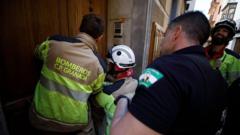**A massive power cut in Spain has led to at least three confirmed deaths, with more incidents under investigation, prompting emergency responses and public concern over safety measures.**
**Tragedy Strikes Amid Nationwide Power Outage in Spain**

**Tragedy Strikes Amid Nationwide Power Outage in Spain**
**Investigation Underway After Multiple Fatalities Linked to Blackout**
The recent power cut in Spain has resulted in at least three fatalities, all within the same family from the municipality of Taboadela, according to the Civil Guard, as reported by the BBC. The tragic event strikes amidst a broader crisis; the blackout began on Monday and significantly affected both Spain and Portugal, causing major disruptions.
The deceased—a married couple and their adult son—were discovered in their home, raising suspicions of carbon monoxide poisoning from a malfunctioning generator. However, no official confirmation of the cause has been disclosed yet. The Civil Guard is continuing its investigation into these circumstances.
In the capital Madrid, a woman in her fifties died in a fire linked to using candles during the blackout, while a woman in her forties in Valencia is suspected to have passed away due to her ventilator losing power, though conflicting reports have emerged regarding her health. As investigations continue, further deaths are being scrutinized.
The blackout caused chaos across much of the Iberian Peninsula; traffic signals ceased functioning, metro systems were halted, and businesses faced payment disruptions, triggering lengthy queues at operational cash machines. The power outage also momentarily disabled mobile networks, leaving residents scrambling for updates.
As officials work to ascertain the blackout's causes, the scope of its impact on everyday life and the urgent need for effective emergency measures have become pressing topics of discussion in Spain and beyond.
With the tragedy unfolding, questions remain about the infrastructure's resilience and safety protocols in the wake of such incidents.
The deceased—a married couple and their adult son—were discovered in their home, raising suspicions of carbon monoxide poisoning from a malfunctioning generator. However, no official confirmation of the cause has been disclosed yet. The Civil Guard is continuing its investigation into these circumstances.
In the capital Madrid, a woman in her fifties died in a fire linked to using candles during the blackout, while a woman in her forties in Valencia is suspected to have passed away due to her ventilator losing power, though conflicting reports have emerged regarding her health. As investigations continue, further deaths are being scrutinized.
The blackout caused chaos across much of the Iberian Peninsula; traffic signals ceased functioning, metro systems were halted, and businesses faced payment disruptions, triggering lengthy queues at operational cash machines. The power outage also momentarily disabled mobile networks, leaving residents scrambling for updates.
As officials work to ascertain the blackout's causes, the scope of its impact on everyday life and the urgent need for effective emergency measures have become pressing topics of discussion in Spain and beyond.
With the tragedy unfolding, questions remain about the infrastructure's resilience and safety protocols in the wake of such incidents.





















